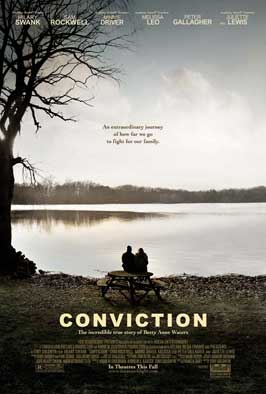
Thursday night was the opening night of the Fall Semester of my movie class and we started strong with the drama “Conviction”, starring Hilary Swank, Sam Rockwell and Minnie Driver.
Synopsis
When a man is wrongly convicted of murder and sentenced to life imprisonment, his sister decides to put herself through law school so she can become his attorney and fight to have him freed – but when a corrupt and incompetent legal system prove major impediments, will she ever get her brother his long-deserved day in court?
Story
In 1980 Ayer, Massachusetts, the elderly Mrs. Brow is brutally murdered. Following two years of the police building up evidence, Kenny Waters (Rockwell) is arrested and charged with the crime; after a trial which featured witnesses that testified of his confession to them and physical evidence pointing to Kenny, he is found guilty and sentenced to life imprisonment. His sister, Betty Anne (Swank), refuses to accept this verdict and despite being a high school dropout, vows to earn a law degree for the sole purpose of being her brother’s attorney so she can fight for his freedom.
While admirable, Betty Anne’s task might be considered foolish not just because of her lackluster educational background, but also because of the fact that she’s a single mother of two boys working to not only raise them but also, put herself through school. Add to that the fact that the seemingly insurmountable evidence against her brother calls into question his innocence, and it seems that this poor woman might be wasting her time, energy and money all for nothing. After many years, she eventually passes the bar exam and begins investigating how best to free her brother. With recent technological advances, she becomes aware of the use of DNA evidence to prove an accused person’s guilt or innocence and miraculously manages to gain the support of legal expert Barry Scheck (Peter Gallagher) towards that end.
Discovering that the results of the DNA test officially eliminate her brother as a suspect, Betty Anne then sets out to try to get signed affidavits from the witnesses who testified at the trial stating that they lied and why they were coerced into doing so. This, however, proves to be easier said than done since the ramifications could result in bringing charges of perjury against them. Additionally, she learns of corruption in the local police department that also led to her brother’s conviction. Facing political and legal roadblocks that create one delay after another, will Betty Anne ever be able to prove her brother’s innocence and earn his exoneration?
Review
For those who don’t already know, this movie is based on a true story. This shouldn’t really matter in the end because ultimately, the movie has to stand or fall on its own merits, regardless of whether or not it’s fictional. That said, this is a very strong movie and one which sports a cast of some accomplished acting talent. Even though you may know (or have a reasonably good idea) how the story ends, you should be able to enjoy the ride on which the filmmakers take you. I found one of the most interesting parts of the story was the flashbacks to the youth of Betty Anne and Kenny which helps you to understand the strong bond between these siblings and why she fought so tenaciously for her brother’s freedom.
If there are any criticisms of the film, it would be the fact that Minnie Driver’s role seems like something of a contrivance in telling the story. Did her character of Abra Rice – a fellow law student in Betty Anne’s class – truly exist? I don’t know. It seemed, however, a bit superfluous – an ally bestowed upon Betty Anne by the screenwriter merely to help advance the story. If, in fact, it turns out this was a real person, then it might call into question what her motivation was to help Betty Anne so frequently and to the extent that she did. Additionally, Swank – who also took a title of Executive Producer on this movie – has some occasional moments where she appears to be chewing up the scenery, but whether or not this is something you might be able to overlook may depend on the degree to which you develop an emotional investment in the story.
The guest interview for the evening was Andrew Karsch, one of the movie’s producers. He spoke about the fact that it took almost a decade to get this film made, in part because even though there were various well-known stars attached to the project at many points along the way, ultimately, most studios tended to feel that this was not going to be the type of movie for which young people would likely purchase tickets – an incredibly important point because that’s the main demographic that Hollywood pursues and caters their product toward. He also spoke of the fact that the epilogue of the movie leaves out the tragic end – the fact that in real life, Kenny died a mere six months after winning his freedom; Karsch said this choice was made because they wanted the film to end on a positive note and were afraid that revealing this information would wind up depressing audiences.
